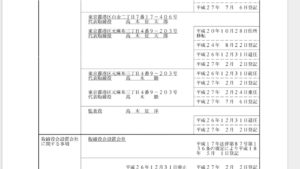1, No Listings Of Shareholders
Although the total number of issued shares, etc., are stated, the name of the shareholder is not listed. The company’s articles of incorporation contain the name, address, and the number of shares held by shareholders (founders).
2, The Articles Of Incorporation are Substantially Unavailable
Only stakeholders (shareholders and creditors) can view the articles of incorporation. Moreover, after five years have passed since the establishment of the company, the Legal Affairs Bureau will destroy the company’s articles of incorporation. Therefore, you cannot practically know the company’s shareholder information from government data.
3, No Identity Details of Executives
Although the address of the representative is stated, only the name of the officer is listed. Therefore, we do not know the details of the officer’s identity.
4, Financial Statements Are Not Disclosed
According to Article 440 of the Companies Act, we must disclose (public notice) the summary of the financial statements. However, most companies do not disclose (public notice) the summary of the statement of accounts in the manner prescribed in the register. Surprisingly, despite the majority of companies not complying with the company law, the government has tolerated it all.
5, No Search Functionality For The Business Interests
In the database of the Registry Search Service of the Legal Affairs Bureau, you can only search the register for the company name. Even if you want to see what other companies have officers taking the position of a director, you do not have any means of conducting a directorship search from the name.
6, Company Registration Can Be Done With A False Address
When the company is established, the Legal Affairs Bureau will confirm the ID of the representative. However, they do not check whether the company’s head office location exists. Therefore, you can also register your company with a fictitious address.
Credit Reporting Agencies Are The Super Authorities In Japan
Through a private database such as Teikoku Databank (TDB) and Tokyo Shoko Research (TSR), you will learn the names of shareholders and number of shares, financial statements, directorship search results, and so on. However, small companies and companies that do not conduct B to B business often refuse to accept a direct interview from company credit reporting agencies like TDB or TSR. Both TDB and TSR will gather information through a direct interview with the company. Therefore, they can’t collect any information on the company if they refuse to take the interview.
They are dominating the Japanese company credit report market. They never trade the name of the client. But, the target company will wonder if they will lose the opportunity of dealing with a new customer or existing customers if they refuse to disclose their information to TDB or TSR. Due to that pressure, most companies will cooperate with those agencies. TDB and TSR are playing significant roles in the field of credit management and performing due diligence based on these unique business habits in Japan. In other words, it is hard to operate a B to B business without being registered in the databases of TDB or TSR in Japan.
In an isolated country like Japan, few people have the consciousness that it is not the global standard. Many of our overseas clients take it for granted that the shareholder’s information, business interests (directorship search), and financial statements are available from the government databases such as company registry records. But, in fact, none such information is available from the government database in Japan.
Contents of the Japanese Commercial Register

- Company name
- Head office location
- Date of establishment Date of month
- Publication method (Publication in the National Gazette, etc.)
- Purpose of work)
- Total number of issuable shares
- Total number of issued shares
- Total number and type and number of outstanding shares
- Regulation on transfer restrictions on shares (To acquire shares of the Company by assignment, it is necessary to approve the company)
- Number of issuable shares
- Number of outstanding shares
- Rules for issuing share certificates
- Capital amount
- Matters concerning officers (*List of names of directors and corporate auditors. For the representative, the address is also listed.)
- Branch office
- Matters concerning Registration Record (Relocation, update of company structure, etc)




